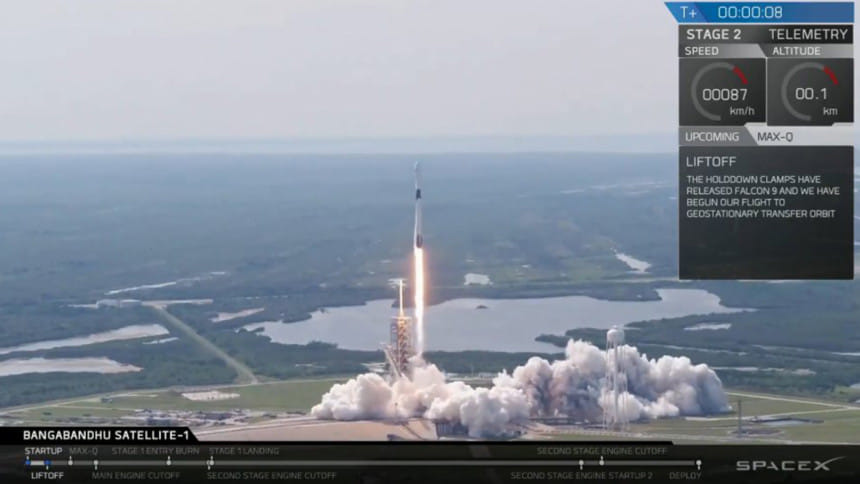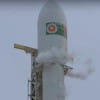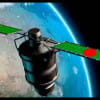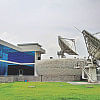Bangabandhu-1 to open doors for huge opportunities

Bangladesh becomes a member of the exclusive club of satellite-owning countries as its first commercial satellite was launched to space in the early hours of today (Bangladesh time 2:14am), opening the doors for huge opportunities.
Experts, policymakers and people related with the country's most sophisticated project said this satellite will give extra pace to the digitisation process and at the same time the country will earn a huge amount of respect from foreign nations after its successful journey.
They said the country's first geostationary communication satellite will firstly help expansion of internet and telecommunication services in remote and rugged areas which still remained beyond the coverage.
Liftoff! https://t.co/gtC39uTdw9 pic.twitter.com/aYHHm24Hca
— SpaceX (@SpaceX) May 11, 2018
"There are more than 750 union parishads in the country where there is no internet connectivity and we want to ensure broadband internet with this satellite over there," said ICT Minister Mustafa Jabbar on Wednesday over phone about the immediate benefits of the satellite that they have planned.
It could give the nation dedicated emergency telecom services on unexpected natural disasters time when all other service went off, Jabbar also added "and this will be the major part of the satellite's benefit."
In the event of unexpected disasters, when traditional telecommunication network may collapse then satellite network can play an important role in ensuring uninterrupted telecommunication services throughout the country, he said.
Surveillance and ensuring national security would appear as a crucial tool for Bangabandhu-1 satellite.
Md Khalilur Rahman, associate professor of School of Engineering and Computer Science at Brac University that have launched the country's first nano-satellite last year, said after launching the satellite successfully many more digital investments will come in the country.
"This is a big part of adopting space technology in the country and developed nation will look at the country with a different point of view after its successful journey," said Rahman.
The government has plans to earn huge amount of foreign currency by selling the satellite's transponder to other countries and save foreign currency that the local television channels now need to spend for their service from others' satellite especially for the broadcasting industry.
Currently, there are 37 satellite television channels in the country and they have to spend about $14 million every year for using transponders of Apstar-7 and Asia set satellites.
Bangabandhu-1 will mostly cover South Asian countries and Indonesia, the Philippines, Myanmar, Tajikistan, Kyrgyzstan, Uzbekistan, Turkestan and a part of Kazakhstan.
The Bangladesh Communication Satellite Company Limited is also trying to sellout some of its transponders to the foreign nations, said Md Saiful Islam, managing director of the company.
"Already we have started the procedure and our main target is to sell the capacity to Indonesia and the Philippines," said Islam.
Two other countries also are on Bangladesh's prospective buyers list, said Islam, who is also the additional secretary of the telecom ministry.
The company also targeted to rent out half of its total 40 transponders having a total 1,440 MHz frequency.
The satellite, a Tk-2,765.66 crore project, will offer Direct-to-Home (D2H) services, making people's access to worldwide TV faster and easier.
DTH services always provide faster access to worldwide television entertainment and now they will have an easier and faster access to global TV entertainment through Bangabandhu-1, said company officials.
The satellite will make video distribution easier as well enabling broadcasters to effortlessly distribute their content to intermediaries like cable TV network operators or re-broadcasters like DTH operators, they added.
The satellite will have VSAT private networks consisting of voice, data, video and internet services to the banks, corporate offices etc.
Bangladesh will be the 57th country after the successful launched of the Bangabandhu-1 satellite into the orbital slot on 119.1 degree east longitude.

 For all latest news, follow The Daily Star's Google News channel.
For all latest news, follow The Daily Star's Google News channel. 








Comments